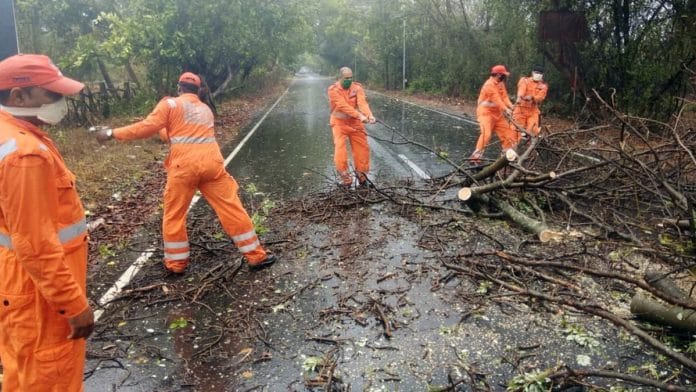New Delhi: Nearly 15 years after the Disaster Management Act was passed, the Narendra Modi government has finally issued guidelines to allow any person or institution to contribute directly to the National Disaster Response Fund (NDRF) set up under the Act.
According to Section 46(1)(b) of the Act, the government can set up the NDRF to allow the public to contribute money. However, no provisions existed for such contribution until now even as the Ministry of Home Affairs said in 2010 that modalities would be prescribed in “due course”.
The NDRF is set up to “meet the expenses for emergency response, relief and rehabilitation” in the situation of a disaster. All states have their own such funds under the Act.
On 19 June, the Union Ministry of Finance approved a home ministry proposal to allow direct individual contributions and set up a new account for it. In an office memorandum, the Department of Expenditure said it had “no objection” to the Home Secretary’s 4 May proposal.
It came after Commodore Lokesh Batra (Retd.) wrote to the National Disaster Management Authority (NDMA), which handles the NDRF, in late April seeking details on the procedure for contributing directly to the fund. He later filed an RTI with the finance ministry over this.
On 18 June, a day before the memo was passed, the 1971 war veteran who is also an RTI activist, told ThePrint, “I have written to the Secretary of the NDMA, Secretary of the Ministry of Expenditure and the Home Secretary of the MHA. But I’m still waiting on a response on how to contribute to NDRF… If I know how, I will be the first to contribute.”
Now, the latest memo allowed “receipts in the form of grants/donations made by any person for the purpose of disaster management may be taken as receipts of GoI under a new minor head” being set up. It said cheques may be drawn by the donor in the name of “PAO (Secretariat) MHA”.
The memo also prescribed a similar procedure for contributions to the state disaster relief funds.
ThePrint reached the NDMA secretary for a comment on the memo but there was no response until the time of publishing this report.
Asked if individual contributions were made to NDRF before this, a finance ministry official said, “Not a single penny has come from an individual or institution for direct contribution to the NDRF. People usually contribute to the PMNRF. Now that individual contribution for NDRF has been activated, let’s see how much people contribute.”
Also read: No new posts, remove re-engaged staff — austerity measures by Railways to soften Covid blow
The PM-CARES issue
The move has come amid a controversy over the PM-CARES Fund, which was set up on 28 March to deal with the Covid crisis. The fund has been criticised for lack of transparency and accountability even as the government has denied such allegations.
Last week, the Supreme Court sought a response from the Modi government on a plea seeking all contributions made for Covid be credited to the NDRF rather than the PM CARES Fund.
Unlike the NDRF, which is subject to audit by the Comptroller and Auditor General of India, it is unclear whether the PM-CARES falls within the CAG ambit. There is no clarity on the amount collected under PM-CARES either.
Before PM-CARES, the mode of donations to the central government in the face of calamities was the Prime Minister National Relief Fund.
Batra’s RTI
In his letter to the NDMA on 23 April, Commodore Lokesh Batra (Retd.) asked its member secretary G.V.V. Sarma on how to contribute to NDRF.
Before the memo was passed, Sarma told ThePrint that the law allowed individual contributions to the NDRF, but declined to comment on why no provisions had been outlined in 15 years.
On 13 May, Batra filed an RTI with the Department of Economic Affairs (DEA) seeking the same details about the NDRF contributions. He followed this up the next day with a letter to the expenditure secretary.
The DEA transferred the RTI, under Section-6(3), back to NDMA and the home ministry. The ministry forwarded the RTI to the Department of Expenditure.
On 15 June, Batra again wrote to the home secretary, expenditure secretary and Sarma, reminding them of his earlier “ignored” letters.
This report has been updated to correct details about Batra’s RTI application.
Also read: 48,000 ventilators in 70 years, 50,000 with PM CARES: Govt, BJP on how fund is being used






